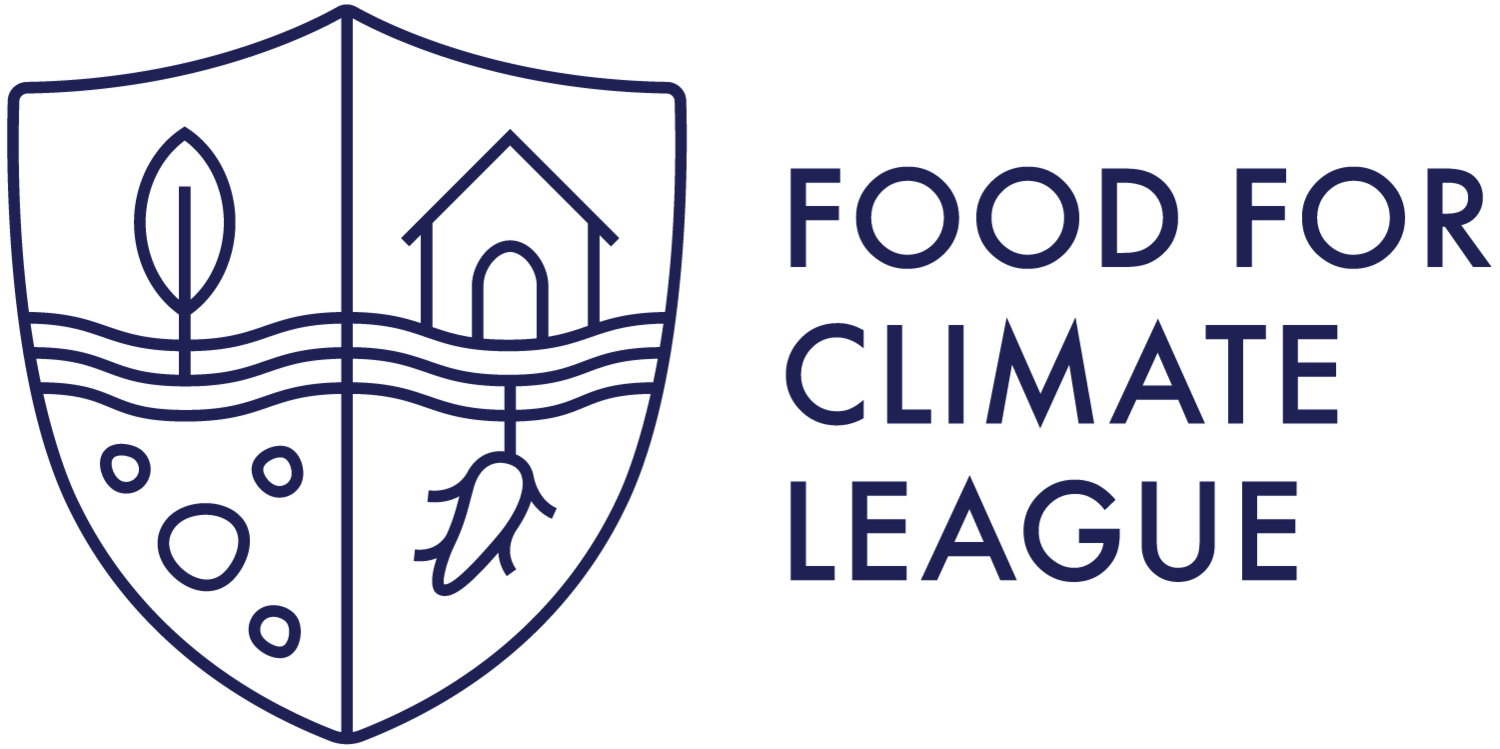
Our Partners
FCL is proud to bring together a growing ecosystem of partner organizations for global knowledge sharing and accelerated paths to action.
As the Food for Climate League’s Partner Roundtable, these organizations work together toward refining, codifying, and scaling the best practices for communicating climate-friendly food choices. FCL facilitates quarterly dialogues and presentations to enable this peer learning and the translation of ideas into initiatives.
Partners also contribute to the Insights Repository, a rich, curated set of the most groundbreaking, relevant reports, articles, and decks on the behavioral psychology, choice architecture strategies, and language and communications tactics that can best drive selection and consumption of healthy, climate-beneficial foods.
Each partner organization brings distinct research insights and methods, theories of change, stakeholder audiences, and sectors within the food system, but they all share a belief in not reinventing the wheel, subject matter expertise, and a passion for advancing climate-smart food for all.
-
1. American College of Lifestyle Medicine (ACLM) is the nation’s medical professional society advancing lifestyle medicine as the foundation for a redesigned, high-value and equitable healthcare delivery system, leading to whole person health. ACLM educates, equips, empowers and supports its members through quality, evidence-based education, certification, research and practice support to identify and eradicate the root cause of chronic disease, with a clinical outcome goal of health restoration as opposed to disease management. Learn more about the course at: https://lifestylemedicine.org
2. ACLM’s Global Sustainability Committee, under the direction of ACLM leadership, is committed to educating our rapidly growing membership and the patients we serve about how the climate crisis and environmental degradation are a growing hazard to the foundation of health and the “healthspan.” For those with chronic conditions - a large and growing subset of the global population - the health dangers are even greater. Climate change is also a threat to the pillars of lifestyle medicine that we rely on to prevent, manage, and sometimes reverse chronic disease.
Why we partner
“A mission critical to ACLM’s work is to scale up the use of lifestyle medicine interventions to ensure evidence-based health care practices that lead to a reduction of unnecessary and carbon-intensive health care services (including surgeries and pharmaceutical use for preventable, lifestyle-related conditions). We aim to highlight the health “co-benefits” and “multi-solving” capabilities of lifestyle medicine prescriptions. Prescriptions for 1) whole-food, plant-predominant diets, 2) physical activity in the form of active transport, 3) avoidance of toxic substances and exposures including air pollution, and nature-based solutions to promote 4) stress management, 5) restorative sleep, and 6) social connection can bolster health equity while also help to mitigate and adapt to the health impacts of the climate crisis.
Partnering with Food for Climate League and working with the various FCL Roundtable partners allows ACLM to promote healthcare-related dietary shift resources and learn from efforts underway in other sectors.”
— Martin Tull, Chief Impact OfficerThe impact they’re having
ACLM has produced an award-winning “Lifestyle Medicine and Food as Medicine Essentials” course, which has been used by over 50,000 healthcare professionals in the past few years. Showcasing the evidence-based approaches to improving health and consuming a more predominantly plant based diet also helps encourage both professionals and patients alike about the positive benefits of shifting dietary patterns. As part of an over $40 million dollar commitment, the course is being offered to up to 200,000 healthcare professionals at no cost.
More details on the course are here. -
“Vision: Leveraging the power of the natural products industry to reverse climate change.
Mission: We are concerned businesses from the natural products industry working collaboratively to catalyze bold action, amplify the voice of business and promote sound policy to reverse climate change.”
Why we partner
"The Climate Collaborative works to empower every company with the tools and resources to reduce their climate impacts across the full value chain--including at the consumer level. We're grateful to partners like FCL working to change the conversation about how what we eat impacts the planet." -Erin Callahan, Director
The impact they’re having
Be sure to check out their Take Action Page. To date, 700 companies have already made over 2,500 commitments to act, helping transform how the food sector addresses climate change. See the commitment areas, get access to resources, and make your commitment today.
-
Count Us In develops and delivers groundbreaking campaigns that harness the power of popular culture to inspire the 'moveable middle' to take action on climate and nature, influencing political and business leaders toward policy and systemic change. Recent examples of Count Us In's campaigns include Green Football (sport in the UK), Earth FC (sport in Brazil and globally) and Sounds Right (music globally).
Why we partner
"How and what we eat, and with whom we share our food, is such a powerful part of our norms and identities. We are excited to work with FCL and the Roundtable of amazing partners to figure out how food, and food culture, intersects with our culture-based campaigning approach and can become a broad entry point for mainstream audiences into action to protect nature and address climate change."
— Eric Levine, Co-FounderThe impact they’re having
Our 2024 Green Football campaign in the UK was delivered by a coalition of 100+ football clubs including all of the Premier League and Women's Super League clubs, Sky and TNT Sports, the UK Department of Education and many others. The headline theme and activations of the campaign focused on promoting plant-based diets, leveraging the cultural power of football (soccer) to engage a mainstream audience. You can see the highlights of the campaign in this two minute video, or dig deeper into the campaign reading the Impact Report.
-
Datassential helps the food and beverage industry more effectively develop, market, and sell their products. By embracing big data and software, Datassential helps manufacturers, retailers, and operators across the food ecosystem make simply smarter decisions. We believe innovation is the product of insight, and that both should be accessible to participants across the food & beverage industry, which is why we’re committed to facilitating inspiration through our products and services.
Why we partner
We believe innovation is the product of insight, and that both should be accessible to participants across the food & beverage industry, which is why we’re committed to facilitating the connection between climate, consumers, operators and manufacturers through our products and research.
The impact they’re having
Check out their insights-packed deck, Climate & the Menu. The consumer climate discussion has shifted from largely disposables and single-use plastics to be more inclusive of the food on the plate. Datassential research indicates climate-based eating is quickly emerging as the specialty diet among younger consumers looking to align personal values and food choices.
-
Who they are
The Food Culture Alliance is a strategic alliance of organizations working together to champion food culture and the role it plays in shifting society’s preferences for nutritious and sustainable foods. Hosted by the Global Alliance for Improved Nutrition (GAIN), the Alliance works with global and local practitioners and organizations, providing them with knowledge, tools, and resources to deploy strategies and accelerate impact at scale.
-
The Future Food Institute is an Italy-based non-profit with global horizons that aims to build a more equitable world through enlightening a world-class breed of innovators, boosting entrepreneurial potential and improving agri-food expertise and tradition.
Why we partner
“The intersection of food and climate has always been at the heart of the Future Food vocation, so when Eve came to us with the Food for Climate League idea, we were happy to join this mission. Partnering with FCL, and being part of the FCL team, expands the reach of knowledge sharing and accelerates our collective paths to action by providing access to both the tremendous internal expertise of the FCL team and the opportunities for collaboration with their impressive partnership network. We are honored and thrilled to work alongside such a dedicated team to tackle the climate crisis together, ‘bite by bite.’” –Sara Roversi, Founder of Future Food Institute, President of Future Food Network
-
Who they are
Greener by Default applies behavioral economics research to food policy, empowering institutions to serve inclusive, sustainable plant-forward food. The concept originated in Europe and was brought to the US by the Better Food Foundation, which incubated Greener by Default. GBD makes plant-based food the default, while giving diners the choice to opt into meat/dairy. This strategy allows institutions to:
-meet carbon reduction goals
-save on food costs
-improve health and inclusivity
…all while preserving freedom of choice.
Why we partner
"Greener by Default is excited to partner with FCL to continue to advance the field of behavioral science and narrative strategy around sustainable food choices." —Ilana Braverman, Co-Founder and Chief Operating Officer
The impact they're having
Greener by Default partnered with LinkedIn to cut their carbon footprint by nudging diners towards more sustainable food and drinks.
-
KM Zero Food Innovation Hub is a Spain-based organization whose team is made up of experts in the food sector, anthropologists, designers, and trend and communication leaders. Together they: nourish foodtech startups, who operate at any point of the food value chain; provide Futures Intelligence in the food industry to help companies stay ahead through innovation strategy projects, co-creation, and access to the foodtech entrepreneurial ecosystem; and generate knowledge for the food sector and organize international events. Lastly, they offer educational experiences to raise awareness among future generations.
Why we partner
“We are excited about contributing to a movement which fully shares our values and mission, and will help us push faster innovation and impact in our sector. As part of this collaboration, we will exchange knowledge and network about relevant issues in the food space, providing our knowledge and connections predominantly in the Spanish-speaking world.” -Beatriz Jacoste, Director
The impact they’re having
Their annual report - Fooduristic: Solutions for the Future of Food - is a compilation of best practices and solutions to the challenges of the food system. Health and Sustainability are pillars of all those innovations.
-
Co-presented and jointly founded by The Culinary Institute of America and Stanford University, the Menus of Change University Research Collaborative (MCURC) is a nationwide network of colleges and universities using campus dining halls as living laboratories for behavior change. Our vision is cultivating the long-term well-being of all people and the planet--one student, one meal at a time. The MCURC is a collaboration of forward-thinking scholars, foodservice leaders, executive chefs, and administrators for colleges and universities who are accelerating efforts to move people toward healthier, more sustainable, and delicious foods using evidence-based research, education, and innovation. The Collaborative consists of more than 250 members from 60 colleges and universities, two ex officio organizations, and five Research Collaborator organizations.
Why we partner
“When it comes to long-term strategies in sustainability, there is no imperative as important to address as climate change. Both at R&DE Stanford Dining and in the MCURC, our approach to climate-smart dining is rooted in the resounding message from climate scientists that our actions to address the climate emergency must be exponential in nature; we are past the time when incremental change is enough. Partnering with Food for Climate League--and their experts in storytelling, human-centered design, youth food culture, and eating behavior--enables us to accelerate the MCURC research pipeline focused on plant-forward diets and food waste reduction: the most impactful food solutions for reversing global warming." -Eric Montell, Executive Director of R&DE Stanford Dining and Co-Director of the MCURC
The impact they’re having
Check out the DISH Study (Executive Summary) and Edgy Veggies Toolkit. These resources translate the findings of a groundbreaking multisite study published in Psychological Sciences into actionable guidance for using taste-focused labels—rather than health-focused ones--to boost the appeal of vegetables. It is the largest study ever measuring food choices across multiple dining halls throughout the United States.The power of flavor-centric, even indulgent and decadent descriptions to drive selection and consumption of veggie dishes has tremendous implications for FCL and its partners’ efforts to most effectively harness the power of menu language to increase consumption of climate-smart food choices (including vegetables, of course, but well beyond—from legumes and heritage grains to sustainable seafood and upcycled foods).
-
Rare’s Climate Culture program accelerates adoption of climate-positive behaviors by changing social expectations. People change when they see others change - so showing that change is already happening and the direction of that change is central. Rare focuses on food, energy, transportation, and nature's power to store carbon with a goal of increasing adoption of key actions by 10%.
Why we partner
“I’m excited to partner with FCL because they approach food decisions through a human centered approach, thinking about the wide range and wants and needs our food choices serve, and work to connect the desired changes with those motivations.” — Natalia Paine
The impact they’re having
This is a behavior change journey playbook for how to think about leading Americans to adopt a more plant-rich diet.
-
“Food Reform for Sustainability and Health (FReSH) is a coalition of leading food companies across the value chain that are driving a food system transformation for healthy people and a healthy planet. We are the leading initiative delivering business-led dietary shifts and improved production practices for human and planetary health around the world. Through our unique business platform, members can guide and advocate for pre-competitive, cross-sectoral and science-based solutions that are ambitious and action-oriented.”
“World Business Council for Sustainable Development (WBCSD) is a global, CEO-led organization of over 200 leading businesses working together to accelerate the transition to a sustainable world. We help make our member companies more successful and sustainable by focusing on the maximum positive impact for shareholders, the environment and societies.”
Why we partner
“FCL brings expertise, professionalism and energy to our shared goal of making sustainable and healthy eating appealing to all. We value the FCL team’s unique insights and creative approach to communicating about food and climate, bringing fresh ideas and exciting new tools to the table.” -Emily Grady, Manager, FReSH
The impact they’re having
Today’s evolving diets are resulting both in food systems that are outstripping planetary resources and generating global health crises of both over and undernutrition. Achieving WBCSD’s goal of healthy people and a healthy planet requires developing healthier, more sustainable foods and enabling consumers to choose those foods more often. The ability of companies to increase the health and sustainability of their portfolios is largely driven by consumer demand, yet consumers don’t always have the tools or ability to choose the options that are in the best interest of personal and planetary health.
The FReSH Positive Consumption Project incorporates insights from behavioral science and economics to influence the environments within which consumers make food choices. Their goal is to make it easier for consumers to choose healthier, more sustainable foods more often, by considering multiple food choice drivers including personal preference, social pressures, convenience, and affordability. They support companies in driving demand for healthy and sustainable food through building shared knowledge, contributing to global narratives, and developing principles on topics like environmental and nutritional labeling.
-
“World Resources Institute (WRI) is a trusted partner for change. Using research-based approaches, we work globally and in focus countries to meet people’s essential needs; to protect and restore nature; and to stabilize the climate and build more resilient communities. We aim to fundamentally transform the way the world produces and consumes food, uses energy and designs its cities to create a better future for all.”
Why we partner
“The climate and nature crisis means it is more urgent than ever to collaborate and work together to rapidly find and scale solutions to the challenges we face. We welcome every opportunity to share insights and knowledge with other organizations seeking to accelerate the shift to healthier and more sustainable diets and to reduce food loss and waste.”
-Anne Bordier, Director of Food InitiativesThe impact they’re having
Coolfood – A World Resources Institute initiative helping the food service industry cut diet-related emissions by 25% by 2030, aligning with the Paris Agreement, and supporting providers serving 9 billion meals annually in climate action.
10x20x30 - A global initiative driving food loss and waste reduction (SDG 12.3) by 2030, where at least 10 major food retailers and providers adopt the “Target-Measure-Act” approach and engage 20 priority suppliers each to do the same.













